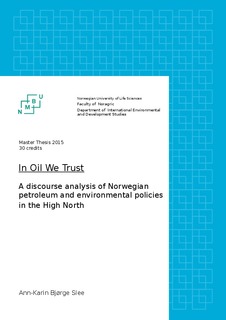| dc.description.abstract | The Arctic is rapidly changing due to global warming, causing both challenges and opportunities for the Arctic countries. Norway has ever since 2005 named the High North its’ most strategic and important foreign policy area, and has published several policy statements in the past decade. These policy papers lay the foundation for the Government’s actions in the High North, and becomes a crucial field of study in order to gain knowledge and insight into the processes leading up to final decision making.
Discourse analysis has been the preferred approach by many scholars when analysing policy papers. Through conducting a discourse analysis, representations, story-lines and interdiscursivity can be detected; unravelling the meanings of the policy papers. In this thesis, I want to discover the main story-lines and representations that supports the Governments further plans for petroleum exploration in the High North vis a vis environmental governance in the region. This is done to highlight the oft-opposing discourses and policies that enables several paradoxes to develop. First, the Arctic is experiencing unprecedented warming due to global fossil fuel consumption, which again will enable further fossil fuel exploitation that leads to increased global warming. Second, Norway claims to be a ‘steward’ of the Arctic environment, while at the same time wanting to expand the industry with the worst impact on the environment.
In wake of this, I highlight three central discourses that represent the Government’s main petroleum policy, namely; ‘drilling for aid’, natural gas as a ‘bridging fuel’ and ‘drilling for the environment’. I also investigate whether there is a development of the High North petroleum discourse in the policy statements from the previous to the current Government. I find that there is a visible ‘intensification’ of the petroleum discourse, as the current Government wants to go ‘from word to action’ in the High North policy. However, a discrepancy in the translation between the English and Norwegian version of the latest Report highlights a possible conflicting discourse with unknown meanings.
Finally, I look at the widening of the High North security agenda in a post-structuralist securitization framework, where I conclude that the Arctic security agenda has been widened to include energy, economic, social and environmental security. However, there is a tendency of looking at the environmental consequences of global warming in an opportunistic and positive light, as it enables further resource exploration. Bringing in a ‘human security’ approach, would help to nuance this development, by highlighting the individual security concerns of the millions of people being affected by climate change in the Arctic. | nb_NO |

